We tested the best joint supplements for dogs
Looking for the best joint supplements for dogs? Here's a round-up of our top picks.

Get the best advice, tips and top tech for your beloved Pets
You are now subscribed
Your newsletter sign-up was successful
If you want to keep your dog’s joints healthy or are worried about arthritis, then you’re right to be on the hunt for the best joint supplements for dogs.
Joint supplements are not a medication and so cannot treat a condition, but keeping your dog’s joints in good health is the best way to keep your dog feeling younger for longer. They come in various forms, like chews, powders, and treats, making them easier to feed than you might think, too.
These supplements help keep their joints healthy and maximize comfort, often containing ingredients like glucosamine and chondroitin, naturally found in the cartilage. To learn more about what these ingredients are, our glossary can help.
Expert vet Dr. Hannah Godfrey says: "I always recommend joint supplements to pet parents with ageing dogs or dogs with an injury or condition meaning they’re more likely to develop arthritis. Sometimes, pet parents are a little skeptical about whether or not joint supplements are necessary or effective. In my experience (and in scientific studies), they are beneficial in slowing the progression of arthritis and delaying the need for other medications. However, to get the most benefit from joint supplements, start them sooner rather than later."
The best joint supplements for dogs 2026
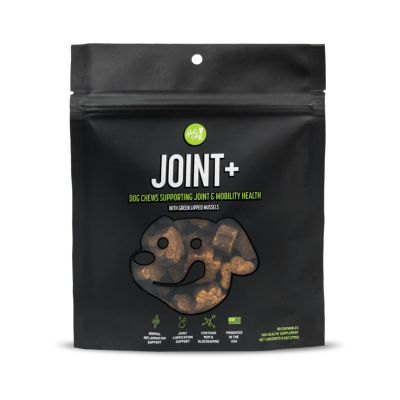
The best joint supplement for dogs overall
These tasty chews are a great way to support your dog's joint health and mobility, containing glucosamine, green-lipped mussel, MSM, and chondroitin. The delicious chicken flavor will make them easy to include in their daily diet. They're also grain-free and gluten-free meaning all pups can enjoy.
Our tester Michael said: “These treats smell great and Teddy obviously agrees because he takes them straight off of me! At the suggested price this compares extremely favorably with similar veterinary-supplied supplements, and also off-the-shelf products available in UK retailers.”
Reason to buy: Chews are easy to eat, contains four important ingredients for joint health.
Reason to avoid: Some reviews say that there are not enough chews in the pack.
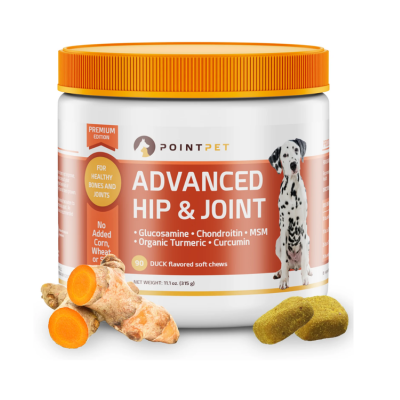
The best runner-up joint supplement for dogs
If your dog is allergic to corn, wheat, or soy, these soft chews are a great choice. They contain chondroitin, glucosamine, MSM, plus natural ingredients like turmeric and yucca to support your dog's joints. They also come in a tasty duck flavoring that your pooch will love!
Our tester Lindsey said: “[They’re a] great size. [My dog] was excited for it every time. I think it’s a great product and anything that can help my aging dog is wonderful.”
Reason to buy: Chews are easy to eat, contains five important ingredients for joint health.
Reason to avoid: Some reviews reported an upset stomach, so avoid if your dog is sensitive.
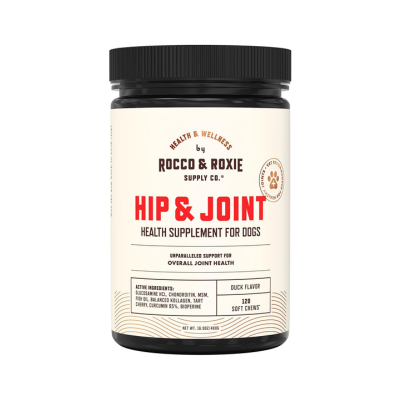
The best budget joint supplements for dogs
These duck-flavored soft chews are vet-recommended and include ingredients like glucosamine, chondroitin, MSM, eggshell membrane, and turmeric. They are also cold-formed, meaning all of the nutritional value is locked in. They're a great choice for those on a budget and have the lowest cost per serving (not dose) in this guide.
Our tester Sarah said: “The size is suitable. It is a bit bigger than a regular vitamin, so I think this supplement is better suited for medium or large dogs instead of smaller breeds. And I can tell it is very palatable for him!” She adds that the quantity and quality is worth the money.
Reason to buy: Budget-friendly, contains five important ingredients for joint health.
Reason to avoid: One review said they were a little messy.
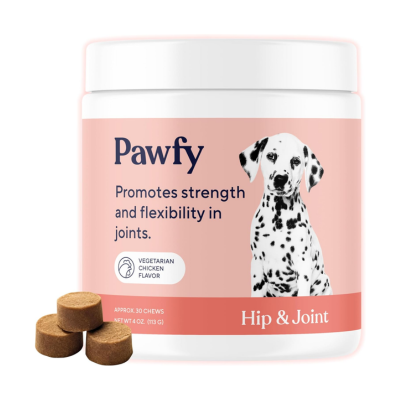
The best premium joint supplement for dogs
These chicken-flavored bites promote healthy joints and flexibility, thanks to the chondroitin, glucosamine, MSM, manganese, and fish oil inside. We love the fact that they double up as a tasty treat, making supplements more palatable for your dog. They might not be the cheapest on the market, but the high-quality ingredients make them good value.
Our tester Lauren said: “[They’re] really easy for Otis to take, so much so that he got excited when we opened the packaging each day. We had no issues [with his sensitive stomach]."
Reason to buy: Chews are easy to eat, contains five important ingredients for joint health.
Reason to avoid: A more expensive option.
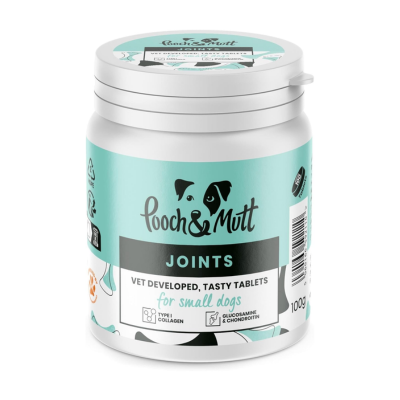
The best tablet joint supplements on a budget
These vet-developed supplements provide extra support for your dog's joints. They're packed with active ingredients, like glucosamine, chondroitin, MSM, vitamin C, collagen, and hyaluronic acid.
Our tester Sophie says: "I definitely noticed a difference in my two dogs taking these supplements. Bluebell is a bit older [... and] I think she was [perkier], happier and active when on these supplements! Frank is young and very bouncy, so while I didn’t notice a change in his movement/energy, it was nice to know that his joints were having a bit of support. I popped them into their meals and they ate them every time!"
Reason to buy: Good value for money, contains five important ingredients for joint health.
Reason to avoid: Tablets might be hard for some dogs to take.
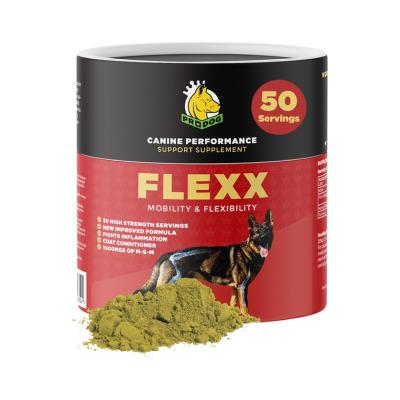
The best food topper joint supplement for dogs
This food topper contains a brilliant blend of MSM, collagen, glucosamine, chondroitin, and turmeric. Not only does it support healthy joints, but it also promotes a healthy coat and skin. It tastes like salmon and can be easily added to your dog's normal food.
Our tester Cloe said: “[They’re] very easy to mix into Bella’s food and she was happy to take it for the first few days, but very quickly started to turn her nose up to it and refused to eat it. The smell is very pungent so I think this may have put her off a little." However, she said the quality is good and she would still recommend it for other dogs.
Reason to buy: Easy to add to your dog's food, contains four important ingredients for joint health.
Reason to avoid: A more expensive option.
How we tested the best joint supplements for dogs
To ensure your purchase is worth every cent, we thoroughly researched the best joint supplements for dogs.
After speaking with a vet about the best ingredients to look out for, we searched high and low for the perfect match. As well as ensuring the products had those golden active ingredients, we made sure everything else inside was healthy for your dog to consume.
Our team of testers then reviewed them based on:
- Affordability: Since supplements are an ongoing purchase and expense, we included a variety of options to suit every budget. Good health should be accessible to every pup!
- Value for money: We asked our testers whether the products were good value for money based on the quality and quantity.
- Easy to use: Dogs aren't always the biggest fans of taking supplements. We asked our testers how easy it was for their dogs to take it, how palatable it was, and whether they turned their nose up at all. This gives you complete transparency of what to expect.
- Repurchase: We also asked our testers the most important question – would they buy it again? This helps you to make an informed decision about whether it's worth your money.

How to choose the best joint supplements for dogs
Choosing the best joint supplements for dogs can feel very overwhelming. That's why we asked Dr. Godfrey what ingredients to look out for.
She says: "Joint supplements usually contain glucosamine and chondroitin, while some contain additional beneficial ingredients like hyaluronic acid, Boswellia, and green-lipped mussel extract.
"Although there are many similar products available, there are differences, so it’s important to choose a reputable brand that is open about its ingredients and uses research to back its claims. For instance, you might feel tempted to use human glucosamine supplements since they are often cheaper. However, dogs can’t absorb glucosamine sulfate, the human version. Instead, choose glucosamine hydrochloride."
Feeling confused about what these long-named ingredients mean? Here's a glossary to help:
- Glucosamine hydrochloride: An amino acid that's found naturally in cartilage (tissue that protects your bones and joints). This is often extracted from shellfish for supplements.
- Chondroitin: This chemical is also found naturally in the body and keeps cartilage healthy.
- Hyaluronic acid: This natural substance helps to lubricate the joints and keeps moisture locked in.
- Boswellia: A herbal extract from the Boswellia serrata tree that may be anti-inflammatory.
- Green-lipped mussel extract: Contains omega-3 fatty acids.
- Methylsulfonylmethane (MSM): This chemical is found in the body or can be produced in a lab. It helps to make collagen and glucosamine.
- Turmeric: A natural spice that may have anti-inflammatory properties.

Is it ever too late to give my dog joint supplements?
These supplements are a great way to keep your dog's body healthy. If your dog already has joint problems, you might be wondering if it's too late to start taking them.
Dr. Godfrey says that they're less effective in established arthritis and that pain relief medication is the most important thing to take with advanced cases. She explains that supplements have "comparatively little effect since the joint tissue is already so abnormal".
She says: "Joint supplements can be safely used in dogs from one year old when they've finished growing. By giving your dog joint supplements throughout their life, you’re doing all you can to prevent degenerative joint disease in the first place, which is particularly important if your dog's breed is genetically predisposed to arthritis."
How do I know if my dog needs a joint supplement?
Joint pain in dogs is very common, but how do you know if your pooch needs to take a supplement?
Dr. Godfrey explains: "Any dog can benefit from a joint supplement, especially those likely to develop arthritis in the future because of their breed, an injury, or a health condition. German shepherds, labradors, golden retrievers, springer spaniels, and some other breeds are prone to joint problems."
If your dog is prone to arthritis, she recommends starting joint supplements at an early age to help prevent it, and if they're already showing signs, they might still be useful. However, you should always consult your vet as they might need additional treatment to help with pain.

Do I need to ask my vet before giving my dog joint supplements?
Most joint supplements are very safe and you can easily buy them over the counter. However, Dr. Godfrey recommends telling your vet about any changes to your dog's care so they can check that it's appropriate, safe, and likely to work (plus whether your dog needs pain relief treatment).


Dr. Hannah Godfrey is a qualified vet who graduated from the Royal Veterinary College in 2011. She is passionate about soft tissue surgery, ultrasound, and canine and feline dentistry, and completed additional training in these areas.
Get the best advice, tips and top tech for your beloved Pets

Megan is a Staff Writer at PetsRadar, covering features, reviews, deals, and buying guides. She has a wealth of experience caring for animals, having grown up with dogs, cats, horses, guinea pigs, and more throughout her life. She studied BA Journalism at the University of Westminster, where she specialized in lifestyle journalism and was editor of Smoke Radio’s lifestyle website. Megan works alongside qualified vets and accredited trainers to ensure you get the best advice possible. She is passionate about finding accurate and helpful answers to your pet-related questions.
